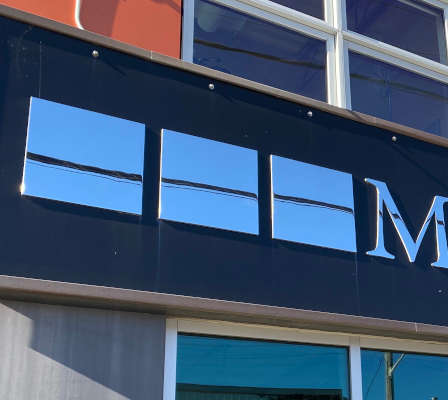
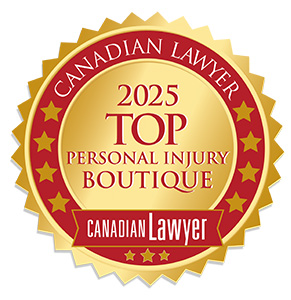

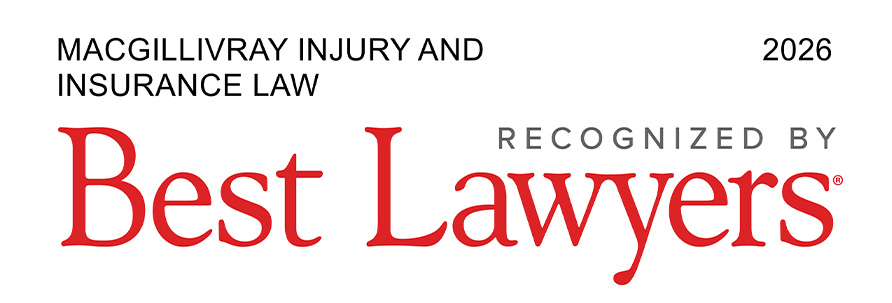
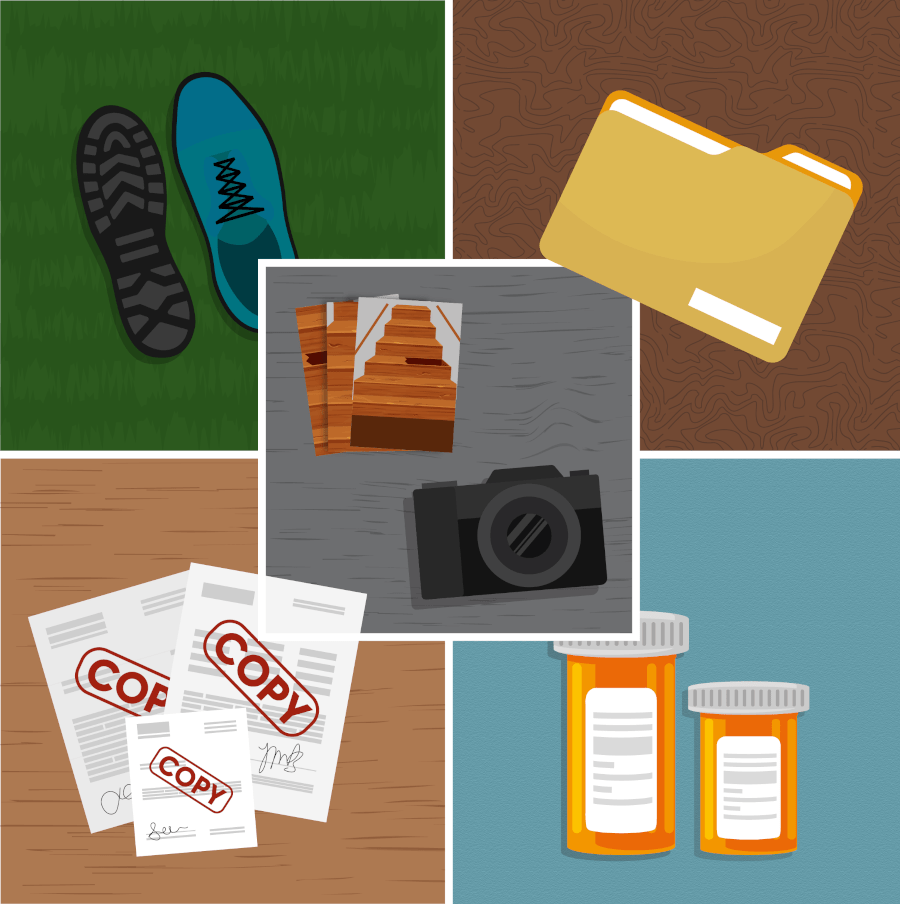
Can I sue after a slip and fall accident in Nova Scotia?
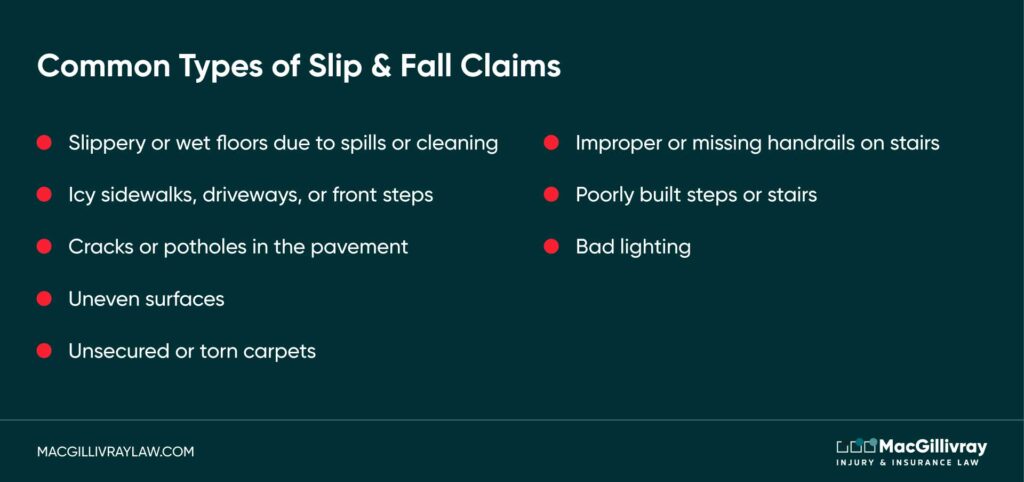
When you are injured on public or private property due to someone else’s negligence, you can sue for compensatory damages. Common types of “slip and fall” claims may include accidents caused by any of the following:
- Slippery or wet floors due to spills or cleaning
- Icy sidewalks, driveways, or front steps
- Cracks or potholes in the pavement
- Uneven surfaces
- Improper or missing handrails on stairs
- Poorly built steps or stairs
- Bad lighting
- Unsecured or torn carpets
If you’ve been injured in a slip and fall accident caused by someone else’s negligence, contact our team for a free consultation.
How do you determine who is at fault for a slip and fall injury?
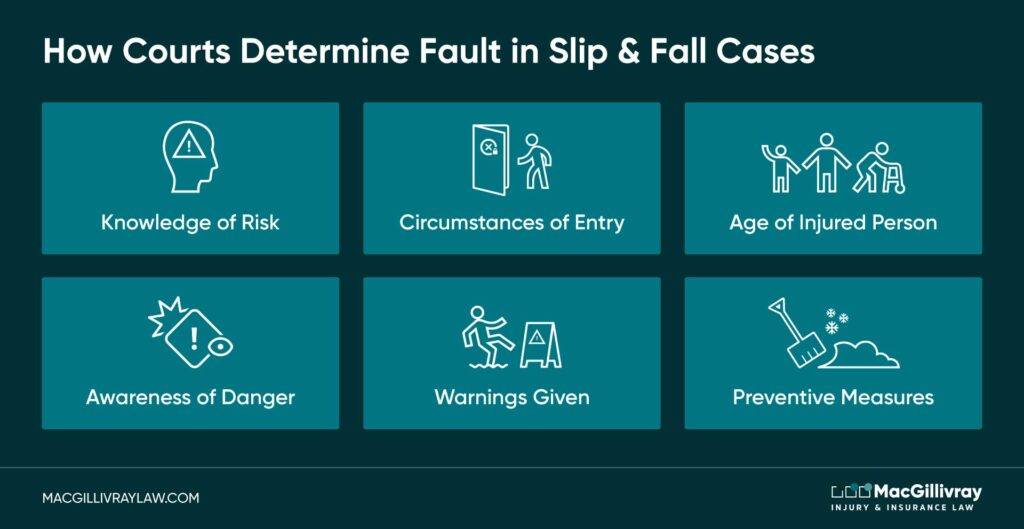
Nova Scotia relies on legislation, specifically, the Occupiers’ Liability Act, SNS 1996, c 27, to determine who is at fault for a slip and fall injury. A property owner, or “occupier”, must ensure that people on their premises are reasonably safe. Occupiers are the people who:
- have physical possession of the premises;
- have control over the premises; or
- are responsible for the condition of, activities on, or people allowed on the premises.
Typically, the “occupier” is the owner of a property. The owner has a “duty of care” to ensure their property is safe for visitors. When this duty is breached, and someone is injured, a claim against the owner can be made.
In determining the responsibility of the property owner, a court must consider:
- the knowledge that the property owner has or ought to have of the likelihood of people or property being on the premise,
- the circumstances of entry into the premises,
- the age of the person entering the premises,
- the ability of the person entering the premises to appreciate the danger,
- the effort made by the property owner to warn people of the risk, and
- whether the risk is one that the property owner could have protected against.
The facts of your case will determine which of these considerations apply. While many slip and fall cases settle outside of court, a personal injury lawyer will build your case while keeping in mind the possibility of defending your interests before a judge.
The Act specifies some exceptions where the duty of care does not apply. A personal injury lawyer can evaluate the facts of your case to determine if the Act applies.
In Marche v. Empire Co., 2001 NSCA 59, the Nova Scotia Court of Appeal confirmed that a property owner must take all reasonable steps to minimize the risk of injury to people on their property. The standard is reasonableness; it does not require perfection. To meet the standard of reasonable care, the property owner must tailor their maintenance system to the circumstances that could give rise to unusual dangers for people on the property, depending on the purpose of the property. What meets the reasonableness standard in one situation may fall short in another.
As demonstrated by the case above, liability in slip and fall cases is rarely simple. What measures are considered “reasonable” may change from case to case. A personal injury lawyer will help you explore the facts of your case to determine your case’s strengths and weaknesses.
How do I prove someone was at fault for my injury?
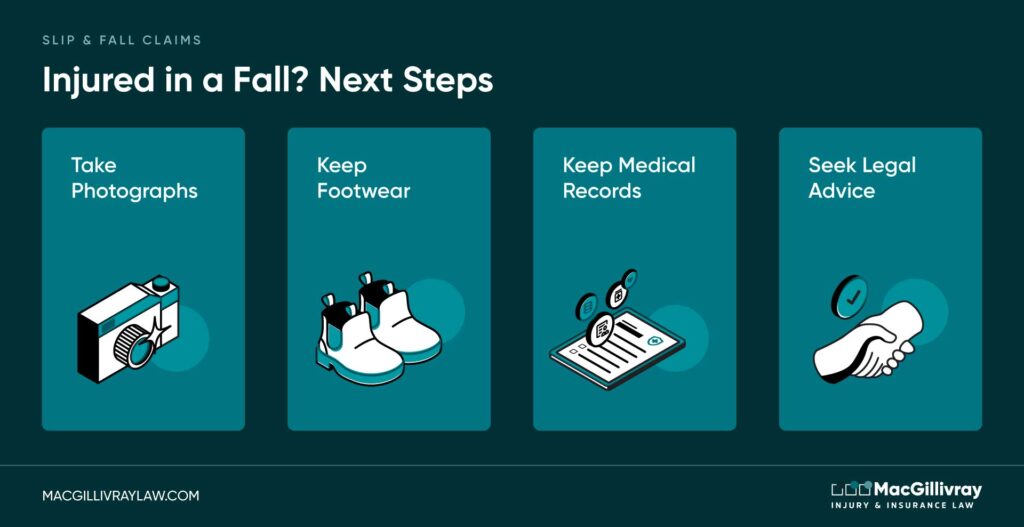
To prove someone else was at fault for your fall, you should gather evidence that strengthens your case. You should immediately photograph where you fell, capturing both close-up and broader views, and ensure the photos reflect conditions during the fall. Wearing proper footwear can further show the fall was not your fault, so you should keep the footwear you were wearing at the time of the fall. Seek medical attention promptly and for as long as it is needed, whether it’s emergency care or a visit to your doctor, to document your injuries. Also, keep all related receipts, like those for treatment or medications.
A personal injury lawyer will navigate the legal process and ensure you’ve collected adequate evidence.
How can property owners prevent slip and fall accidents from occurring?
There are several ways to protect people from being injured on a property. The following list is not exhaustive:
- Ensuring warnings of any potential dangers are visible.
- Ensuring premises are lit.
- Ensuring walkways are clear.
- Repairing any potholes, uneven thresholds, and damaged stairs and railings.
- In the winter, ensuring safety salt is spread to avoid ice-covered surfaces.
Failure to take reasonable measures to protect visitors to a property can result in a civil lawsuit for negligence if someone is injured.
How much is my slip and fall injury claim worth?
In a slip and fall injury claim, you can be awarded financial compensation, called “damages” under the following categories:
- General Damages: The general damages portion of an injury claim is to compensate people for their pain, suffering, and loss of enjoyment in their life. General damages vary based on the type of injury a person sustained.
- Lost Wages: Past lost wages describe compensation for the wages you lost, incluing time off immediately following an accident, time off for medical appointment and therapy, and any leaves you may have needed to take as a result of your injury.
- Medical Expenses: Medical expenses are costs incurred as part of your diagnosis, care, and treatment. These costs include ambulance fees, expenses from the hospital, physical therapy, fees associated with diagnostics and imaging, prescription medication, medical supplies, and other related expenses.
- Loss of Earning Capacity: Loss of earning capacity describe a lump sum award when a person has lost some of their ability to work due to their injuries, but the loss cannot be calculated with precision.
- Future Lost Wages: Future lost wages describe the compensation received by an injured party for the wages they will not receive in the future because they have had to stop working due to their injuries.
- Loss of Essential Services: Loss of valuable services covers the cost of housekeeping, home maintenance, and other essential services that an injured person may require after their car accident if they are no longer able to do that work after their injury.
You can use our Injury Claim Calculator to learn more about how a claim is evaluated. Learn more about General Damages by reading our guide.
The amount of money awarded under each category depends on the loss incurred because of your injury. Some common injuries that arise from falls include:
- Ankle fractures or breaks
- Wrist fractures or breaks
- Concussions
- Nerve damage
- Damage to internal organs
- Chronic pain
- Hip fractures or breaks
- Neck, back, and spinal cord injuries, such as herniated discs
- Shoulder dislocation
- Muscle strains
- Knee fractures or breaks
Keeping an organized record of your appointments, time missed from work, injury-related limitations, and any money spent because of the injuries sustained in the fall is valuable information in building your case. These incurred costs can increase the amount of money you are awarded in a claim for personal injury.
Since each claim is unique, the best way to get an accurate valuation of your claim and maximize your award is to speak with an experienced personal injury lawyer.
How long do I have to sue after a slip and fall accident?
In Nova Scotia, you must file a personal injury lawsuit within two years of date of the accident. However, there are conditions that can shorten or extend this deadline. For example:
- If the injured party is a minor, the two-year limitation period is extended.
- If the property is owned by a municipal, provincial, or federal government, you may have to notify them of your intention to sue earlier than the two-year deadline and the limitation period may be shorter than two years.
Although you may have two years to file a personal injury lawsuit, you should speak to a lawyer as soon as possible after an accident to make sure that time-sensitive evidence is collected, like photos of the dangerous property conditions, security video footage, or witness statements. If you delay, this evidence may be lost or obstructed, making it more difficult to prove negligence.
An experienced personal injury lawyer has a thorough understanding of the laws and limitation periods that apply to slip and fall accidents.
Do you need a lawyer for your slip and fall claim, and how much does it cost?
Insurance companies often aim to minimize payouts after a slip-and-fall incident. Having a lawyer means they’ll handle communications with insurers, gather necessary evidence, assess medical expenses, negotiate settlements, collaborate with experts, and ensure your interests are prioritized while you recover.
We operate on a contingency basis. You only pay when you receive a settlement or win at trial, with our fees being a percentage of that award. We cover upfront costs, like expert reports, to maximize your claim’s value. Before your case settles, you’ll know the net amount you’ll receive in your pocket. If your claim doesn’t succeed, you pay nothing.
Learn more about the benefits of hiring a personal injury lawyer.
Where can a slip and fall accident occur?
A slip and fall accident can happen almost anywhere. However, there are common places where a slip and fall accident is more likely to occur, some of which include:
- Parking lot
- Hotel
- Restaurant or nightclub
- Workplace
- Staircase in residential or commercial building
- Entertainment establishment
- Driveway or walkway
- Gas station
- Swimming pool
- Nursing home or assisted living facility
- Amusement park
- Medical treatment facility
- Escalator or elevator
- Publicly owned space like sidewalk or street
Can I sue if I slip and fall in a store in Nova Scotia?
If you slip and fall in a store due to its negligence in maintaining a safe environment, you may pursue legal action. In fact, slip and fall incidents in stores are quite common. For context, over 42,000 workers face injuries from falls annually, and this doesn’t even account for customers.
The following slip and fall cases demonstrate outcomes where the injured party won damages in court. While many personal injury claims settle outside court, lawyers often refer to case law to negotiate favourable settlements for their clients.
Marche v. Empire Co. Ltd., 2000 CanLII 3521 (NS SC): Ms. Marche slipped on a grape in a grocery store, injuring her tailbone and lower back. The store was deemed responsible since it knew about frequent produce spills yet lacked precautions like mats, warning signs, or proper cleaning. Consequently, the store was found entirely liable for her injuries.
Lawson v. Costco Wholesale Canada Ltd., 2010 ONSC 360: Ms. Lawson sued Costco after slipping on a piece of lettuce that had fallen from a Caesar salad display, injuring her shoulder, leg, and hip. Her lawsuit was successful because Costco failed to follow its maintenance system, and the store could not prove that the employees had cleaned the floors to remove hazards.
Legood v. Atlantic Wholesalers Ltd., 2002 NBQB 41: Ms. Legood sued Atlantic Wholesalers after she slipped and fell in a pool of watermelon juice while shopping in the store. She was successful because Atlantic Wholesalers could not show that its employees had followed the maintenance plan and checked the floor areas to remove hazards.
Can I sue for a slip and fall at a rental property?
If you slip and fall at a rental property due to the owner’s negligence in ensuring a safe environment, you can pursue legal action. Typically, if the landlord is found liable, their insurance company would be responsible for compensation. While many claims are settled outside of court, lawyers often reference case law to negotiate favourable settlements.
For instance, in Hunter v. Anderson, 2010 BCSC 1591: Ms. Hunter, a tenant, injured her elbow necessitating surgery after slipping on black ice on her apartment stairs. She was deemed 75% liable since she wore inadequate winter footwear and had agreed to handle snow removal in return for reduced rent. The landlord’s liability was therefore reduced accordingly, but she was still required to pay 25% of Ms. Anderson’s assessed damages.
Can I sue for a slip and fall at an Air BnB?
If you slip and fall at an Air BnB due to the host’s negligence in ensuring a safe environment, you have the right to pursue legal action. Hosts should maintain their properties to avoid hazards. If they don’t and you’re injured, they could be held liable.
If insured, the host’s policy may cover your injuries. Additionally, Airbnb provides Host Protection Insurance (HPI) which offers up to USD 1 million coverage per incident for bodily injury or property damage. However, it doesn’t cover damages from mold, pollution, or intentional harm to the property.
Can I sue for a slip and fall on a sidewalk?
In Canada, winter often brings icy sidewalks, and weather changes can cause potholes or cracks. If you’re injured due to these hazards, you might be able to pursue legal action. However, as many sidewalks are government-owned, you must be aware of strict timelines to notify of your intent to sue. While many claims are settled outside of court, lawyers often reference case law to negotiate favourable settlements.
Bowden v. Withrow’s Pharmacy Halifax (1999) Ltd., 2008 NSSC 252: Ms. Bowden fell transitioning from a sidewalk to a crosswalk in slush. Although the sidewalk fronted a pharmacy, snow removal was contracted out, and the Halifax Regional Municipality oversaw both the crosswalk and sidewalk. The pharmacy was not held responsible, but the municipality settled the claim with Ms. Bowden.
Can I sue my employer if I slip and fall at work?
Generally, if you are injured in a slip and fall accident at work, you will be covered under Workers’ Compensation benefits. If you are not covered under Workers’ Compensation benefits, you can bring a civil claim. If you were injured at work and are unsure of how to proceed, you should seek legal advice.
Can I sue if I slip and fall at someone’s house?
If you’re injured due to a homeowner’s negligence in ensuring a safe environment, they could be liable for your injuries. In many cases, the homeowner’s insurance might cover such incidents. While many personal injury claims are settled outside of court, lawyers often reference “case law” to negotiate settlements.
Gill v. A&P Fruit Growers Ltd., 2009 BCSC 412: Mr. Gill fell from a mobile home door lacking stairs. Because of his alcohol impairment and failure to look before stepping, the court found him 30% liable. Since the homeowner invited him and didn’t warn of the hazard, they were deemed 70% liable for his injuries.
Can I sue if I slip and fall while playing recreational sports?
If injured during recreational sports due to the organizer’s negligence in warning about risks or the venue’s failure to ensure safety, you might have grounds to sue.
We represent people injured in slip and fall accidents in Nova Scotia
At MacGillivray Injury and Insurance Law, we understand the physical, emotional, and financial toll that slip and fall accidents can take on your life. Our dedicated team of personal injury lawyers is here to guide you through the legal process. We are committed to securing the compensation you deserve and helping you get your life back on track. Reach out today for a free consultation with a member of our team.
Have questions for our team?
Request a
Free Consultation
If you would like to learn your legal options at no obligation, contact us today to set up a free consultation.
